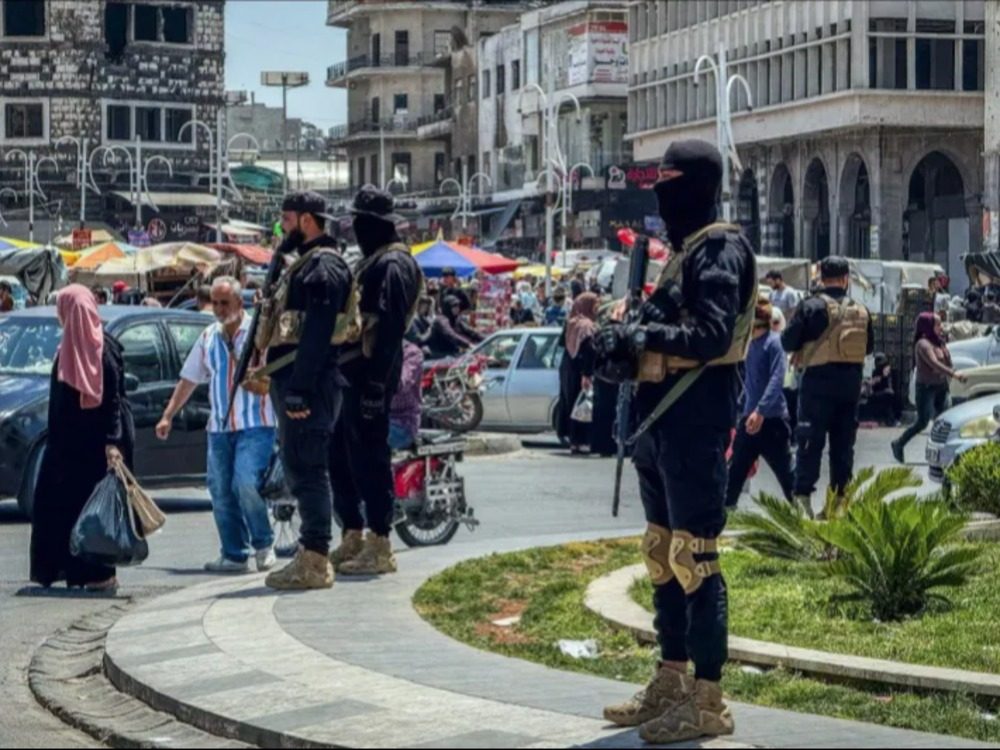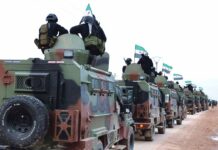
Syria’s security forces, in cooperation with US and coalition partners, intensified operations against remnants of the Islamic State group (ISIS) in recent weeks, killing and arresting several senior figures and disrupting cells across the country.
On Aug. 19, US Central Command announced the killing of a senior ISIS official and financier in northern Syria, describing him as a “direct threat” to regional security. Admiral Brad Cooper, CENTCOM commander, said in a statement that forces “will continue to pursue ISIS terrorists with unwavering resolve throughout the region.”
Days earlier, coalition forces carried out an airdrop in the town of Atma in Idlib province, targeting Salah Noman, an Iraqi national accused of directing ISIS networks. Syrian security sources reported that Noman attempted to flee before being shot and killed. His electronic devices were seized during the raid. According to Al-Ikhbariya, the operation was conducted jointly by coalition troops and Syrian security services. No civilian casualties were reported.
Local Security Forces Confront Attacks
While foreign-backed raids focus on senior leaders, Syrian internal security has also faced direct attacks. On Aug. 22, two ISIS militants launched a suicide assault on a checkpoint in the city of Mayadeen in Deir Ezzor province. Security forces intercepted one attacker before he could detonate his explosive belt, while the second managed to trigger his device, killing a member of the Internal Security Forces.
Colonel Dirar al-Shamlan, commander of internal security in Deir Ezzor, said forces “neutralized both terrorists” and vowed continued pursuit of sleeper cells. “We will not allow remnants of terrorist organizations to threaten the security and stability of our people,” he told SANA.
Officials said the government has intensified efforts to prevent ISIS from regaining ground since the fall of Bashar Assad’s regime in December 2024.
UN Officials Warn of Persistent Threat
Despite recent counterterrorism gains, UN officials caution that ISIS remains a serious threat. Vladimir Voronkov, undersecretary-general of the UN Office of Counter-Terrorism, told the Security Council that the group “seeks to regain its operational capabilities by exploiting separatist and sectarian tensions.”
Voronkov pointed to dire conditions in northeastern Syria’s displacement camps, which house tens of thousands of women and children, warning that insecurity there “increases the risk of extremism.” Natalia German, head of the UN Counter-Terrorism Committee, added that deteriorating humanitarian conditions provide “fertile ground for the spread of extremism.” The UN urged member states to back counterterrorism efforts with approaches that also address governance, human rights and development.
Regional Cooperation Expands
At the regional level, Syria participated in the 37th Arab Conference of the Arab Expert Group on Counter-Terrorism, held Aug. 20–21 in Tunis. Brig. Gen. Samer al-Hussein, head of the Syrian delegation, said the meeting focused on the use of modern technology by terrorist groups and ways to bolster Arab cooperation.
In Damascus last month, Interior Minister Anas Khattab also met with Spain’s special envoy to Syria, Antonio Gonzalez, to discuss counterterrorism training and coordination on immigration systems. As operations continue, Syrian officials stress that international partnerships remain essential to containing ISIS cells and preventing a resurgence.








